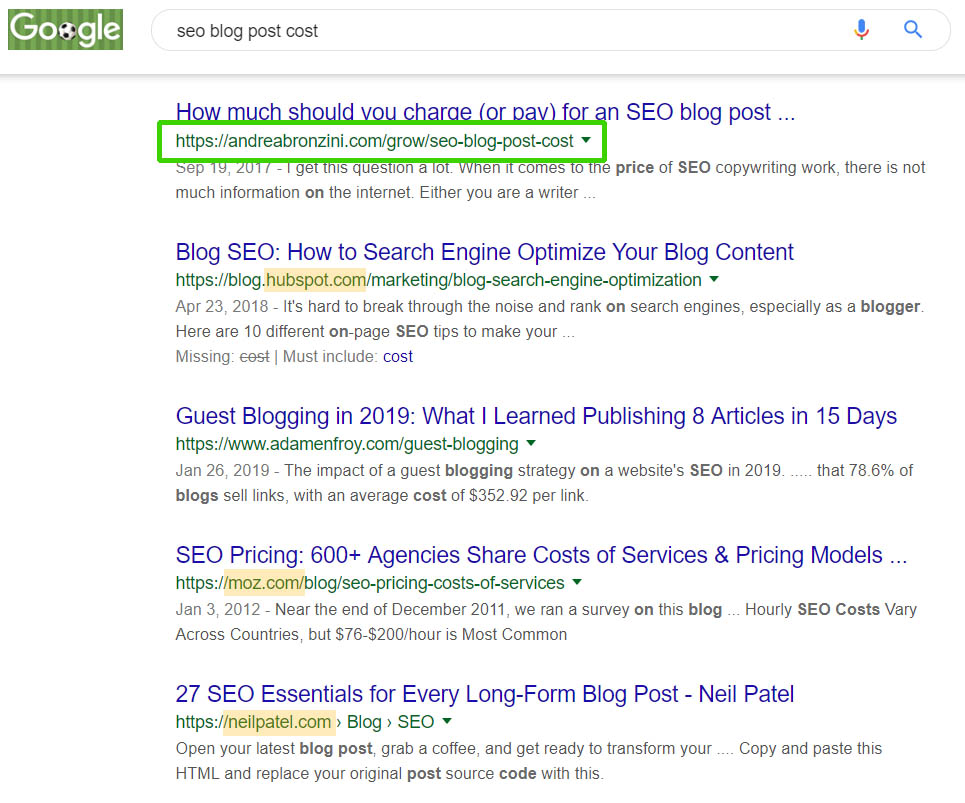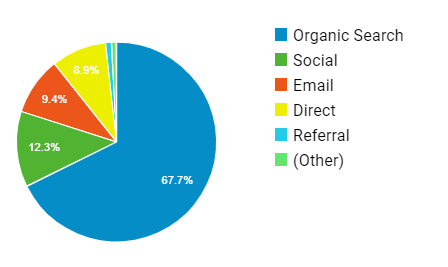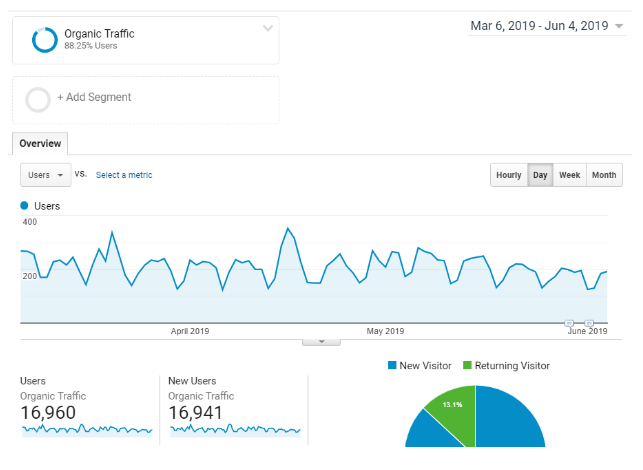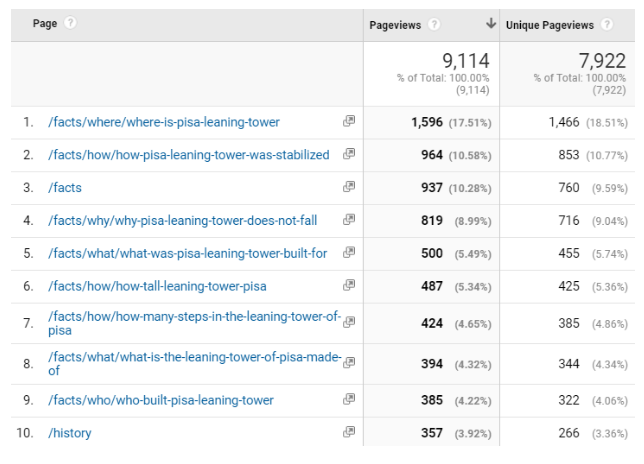I get this question a lot. When it comes to the price of SEO copywriting work, there is not much information on the internet.
Either you are a writer or you have a website of your own and you are buying posts, this kind of info is essential for running your business at its best.
In this article, I propose a simple empiric formula to estimate the value of the content on a website.
Blogger rates are different and in general it is fair to say you get what you pay for.
Blog posts come in all sorts of shapes and flavors. When I say “search engine optimized post”, I mean a post that ranks on page one of Google for at least one keyword with some relevant search volume.
In other words, I mean a post that will generate an organic traffic of at least a few hundred visitors per month.
In this article, I am talking about this kind of post.

One professional who writes content designed to rank on top of millions of other entries in Google’s Index, shall go by the name of SEO Copywriter, SEO Writer, SEO Blogger.
It is important to stress that most of the professionals who call themselves “bloggers” do not write with a focus on reaching this outcome (organic traffic).
In this article you'll learn:
- how long a search engine optimized blog post should be
- which are the characteristics of "good website content"
- why organic traffic is important
- how to calculate the value of your organic traffic
- how to calculate the value of the content on your website
- how you can learn to become an excellent SEO copywriter (or how to get the knowledge you need to hire one)
How much to charge for a 500-word article?
This is a silly question.
Who buys a blog post does not want words. He wants “meaning” and traffic.
Yes, I get it... since meaning and traffic are two metrics that cannot be measured upfront, “words” is a surrogate metric often used to estimate the value of the piece of content.
So what’s wrong with it?
Here a few things that come to my mind when I think to a “500-words article”:
- the quality of the words is more important than the number.
- 500 words is a short article and most likely won’t bring you on page one of Google, therefore, unless this writing has a specific purpose (i.e. technical writing), it is worthless.
- 500 words is a short article. If the question is asked by a freelancer, it screams lazy. If the question is asked by a website owner, it screams cheap. In both cases, it screams ignorant.
As a rule of thumb, you should never publish on a website content shorter than 1000 words.
In other words, you should never write or buy content shorter than 1000 words.
Why?
Because the posts that rank on page one of Google are rarely (almost never, really) 500 words long.
You can verify this yourself, just Google something and then open the articles on page one. Check how long they are and get a feeling for what Google thinks should be on page one.
There is a whole bunch of reasons to why short posts don’t rank well.
Let’s just say that the meaning and value you can pack into 500 words is less than what you can pack in 1000 or 2000… and let’s add that the time 500 words can keep a visitor busy is less than what a long post can do.
There you have it.
Don’t write or buy short posts.
SIDENOTE: this post is over 2600 words and it does rank on page one for the keyphrase you see in the screenshot below.
You can also see it ranks on top of hubspot.com, moz.com, and neipatel.com.

Good content generates traffic
As I mentioned above, the scope of website content is not just to fill a screen with characters.
Website content should satisfy at least one of the following objectives:
- drive organic traffic to the website
- drive referral traffic to the website
- drive social traffic to the website (through organic shares)
- create brand awareness
- deliver information about your company / product / service
- create an emotional connection with the reader/viewer
Although all the objectives above are valid ones, you cannot effectively achieve 4, 5, 6 if the traffic to your pages is zero. It is a good practice to couple one of the traffic objectives (1, 2, 3) with one of the branding objectives (4, 5, 6).
So, again, a good blog post should have meaning and deliver value to the reader while being able to generate some kind of traffic.
In a healthy website, organic traffic is usually the primary source of traffic acquisition (see image below).
You can check your acquisition distribution (chart “Top Channels) from your Google Analytics: GA > Acquisition > Overview.
If the top acquisition channel for your website is not organic (i.e. social is the primary source of acquisition, as shown in the image below), you probably have not invested in good blog posts and your organic reach is way smaller than it could be, hence the current traffic to your website is a fraction of what it could be!
IMPORTANT: there are a few exceptions to this rule for those websites that deal exclusively with services related to Social Media and/or Social Media Influencers.
The value of organic traffic
It takes time to build organic traffic.
Like everything that requires commitment and effort, investing in creating a steady stream of organic visitors is not something everyone does.
Most companies rely on “faster” traffic generation strategies, such as social media or email campaigns. This type of traffic is notorious for being very volatile and last for a few days at best.
Organic traffic is stable. It is something you can rely on, at least on the mid-term.
When you start ranking for terms that bring in considerable traffic, usually that situation will endure until a competitor does a better job than you at tackling that keyword or topic.
In most industries, this time is measured in months or years.
This means your efforts will bring tens of thousands of people to your pages before you are dethroned by a competitor (if it ever happens).
Organic traffic is very valuable because it is a long-lasting renewable source of new customers.
Consequently, creating content that will bring organic traffic is an investment, not a cost.
Paid advertising sets the pace
At this point, it is fair to ask how much that search traffic is worth in dollar terms.
Ultimately, the value of a visitor depends on how good of a job your website does to convert that visitor into a paying customer and how much money that customer will bring to your business.
While this is universally true, it comes with 2 problems:
- It is highly subjective
- it is a piece of information you don’t have when you start a new website.
So how can we estimate the value of traffic when we are just starting out?
Luckily there is someone who did the heavy lifting for us: Facebook.
Facebook is an advertising platform and it offers to bring visitors to your website upon payment of a “per click” fee, known as CPC (cost per click).
Facebook CPC varies by industry and region and there are statistics documenting the “average” CPC cost.
A quick Google search for “facebook advertising cost by industry 2018” returns a number of articles.
Among the other, I choose this one from Wordstram to extract some numbers for my calculations.
In the article, you can see a table with the average cost per click by industry.
For your convenience, I copied the table here...
| Industry | Average CPC |
|---|---|
| Apparel | $0.45 |
| Auto | $2.24 |
| B2B | $2.52 |
| Beauty | $1.81 |
| Consumer Services | $3 .08 |
| Education | $1.06 |
| Employment & Job Training | $2.72 |
| Finance & Insurance | $3.77 |
| Fitness | $1.90 |
| Home Improvement | $2.93 |
| Healthcare | $1.32 |
| Industrial Services | $2.14 |
| Legal | $1.32 |
| Real Estate | $1.81 |
| Retail | $0.70 |
| Technology | $1.27 |
| Travel & Hospitality | $0.63 |
See also: Facebook CPC per Country.
The CPC ranges between $0.45 and $3.77.
A pretty wide range I’d say… the higher end of the spectrum is 8.4 times more expensive than the lower end.
What does it mean?
It means that in some industry advertisers are willing to pay more to bring a set of eyes to their pages.
In those industries there is probably more competition and, despite that, advertisers are able to squeeze out more profit for each … making it possible to continue advertising at such a high price.
Anyway, given an industry, one can check what’s the average CPC that Facebook deems “fair” to charge.
If you were to pay to get a visitor to your website, that’s what you’d have to spend.
A visitor coming to your website via a Google search (organic traffic) is no less valuable than that (actually it is more as organic traffic tends to convert better).
Calculating the value of website content
Let’s now use this information to make a real example.
I’ll show you the traffic analytics for one of my websites and we’ll calculate the value of its content.
Back in July 2017, I spotted an opportunity for making a website about the Leaning Tower of Pisa.
I researched the topic and wrote the content in less than two months. 15 articles in total.
That website went online in September 2017.
Two more articles were added later in December 2017 and January 2018.
Today the website brings a steady stream of organic visitors, averaging to 5,653 users per month (calculated on last three month, see image below).
This website is in the category “Travel and Hospitality” and according to the Wordstream table shown above, to bring a visitor to the website the average FB CPC is $0.63.
If I were to replace my traffic with paid traffic, I should expect to pay $3,561 per month (5,653 x $0.63).
Over the course of one year that traffic would cost me $42,732 ($3,561 x 12 months).
I also should point out that the “expected lifetime” of content is well over one year.
In this specific case, I expect numbers to increase in the next months.
It would be fair to assume good content can perform increasingly better for a period of not less than 18 months.
This raises the cost of equivalent traffic from paid ads to $64,098 ($3,561 x 18 months).

$64,098 is what I should pay over 18 months to “enjoy” 5,653 users sent to me from Facebook each month.
With this information in mind, how much is worth the content on my website?
I think a fair price would be anything between 5 times and 10 times less than the price Facebook is asking.
In this case, the value of my content ranges between $6,010 and $12,820.
Remember the website is made of 17 articles.
If I were to buy those article on a budget and I managed to close a deal for $6000, one article would have cost me $353.
That pretty much represents a good starting price for a high-level SEO copywritten blog post.
I say starting point because:
- this topic was an easy opportunity, hence required less work
- this industry is not too saturate (low CPC)
- the “discount” I considered for making the deal is 10 times less the price of Facebook CPC
If you are a freelancing writer, my recommendation would be to start pricing your work from 5 times less than FB ads and then negotiate your way down to 10 times less.
In most cases, you’ll be able to close the deal around 7 times less than paid advertising.
If you are buying content, you should negotiate the price down but remember what you are saving. This stuff is worth money… don’t take advantage of people.
Does it apply to a single article?
At this point, one might think that every article is well worth above $353.
That’s not the case.
Let’s have a deeper look at my Google Analytics: BEHAVIOR > SITE CONTENT > ALL PAGES
You can clearly see that a few pages bring a lot of traffic while others bring much less.
In average, each one of the 17 articles of this website brings about 333 users per month.
...but of course, some is more valuable than others.
When you start writing, it is impossible to know which one will be a winner and which one will lag behind.
The reason I am raising this issue is performance, not money.
In fact, the average value of an article is still the same but you cannot be sure that writing one single article will drive at least 333 organic users per month… as a matter of fact, if you write (or buy) just one article, you could be writing (or buying) that one article that ranks on page two and brings no traffic!
What I’m saying here is that you should always make a content plan and propose to deliver a content package engineered to rank.
The same is if you are buying. You should always aim to get a content package and not just one article.
How do you know if a writer is good enough?
Writing search engined optimized content requires knowledge, skills, experience.
There are lots of details one should consider and many things one should know to get the content package right and maximize the possibility of ranking well.
I have been actively practicing SEO copywriting since 2011 and I have been teaching it to others for the last a couple of years.
As the number of people I can work directly with is limited by my time, I decided to put together a course that can help others to learn SEO copywriting and drive organic traffic to their website.
Whether you are a writer or you plan to buy content, there is a lot you can get from this course.
The organic traffic course is designed to be completed in less than two weeks and it includes a video review of your work.
Yes, that’s me going over your article and pointing out what you can improve.
As I have just so much time in a day, there are two limits/conditions I had to set to be able to offer this service:
- I take only a limited number of students at any given time
- you have to send me the article not later than 3 weeks after buying the course
Both conditions are in place to hold you accountable to take real action and to help me to cope with the demand.
If you are interested in the organic traffic course, you can enroll here.
NOTE: enrollment to the course will most likely be closed when you visit the page but you can leave your email and I’ll send you an invitation when I open it again.
The enrollment period usually lasts one week, although the spots are sold way faster than that.
Conclusions
Your online business needs a steady stream of new visitors.
Organic is the most affordable and reliable traffic source.
If you are serious about doing business online, you need to invest in creating good website content.
Good website content ranks on page one for specific keywords with relevant search volume.
Once published, it will bring people on your website - for free.
When you have enough organic traffic, you won't need to use paid advertising, hence you'll save lots of money.
Good website content can be created at a fraction of the cost you'd have to pay in advertising.
If you want to get good in writing or understanding search engine optimized content, you need to invest in your education.
Comments?
We all love comments... but let's keep this page neat and clean.
You are welcome to post your love and hate on this dedicated Facebook post:








